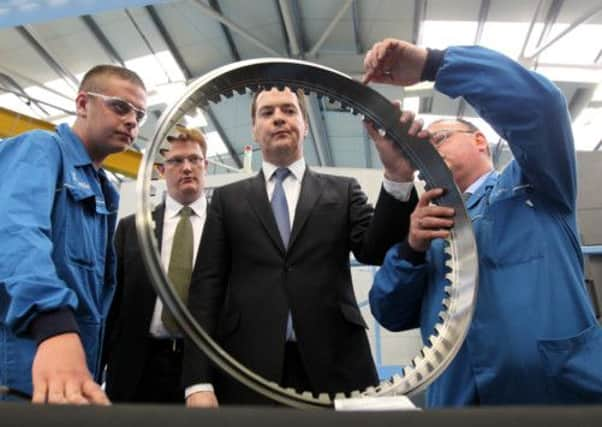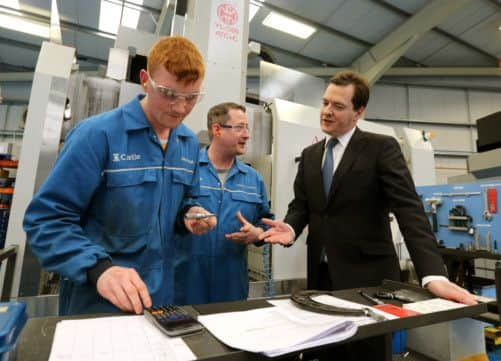Independence: Pound pact ‘not worth it’ - Osborne


• George Osborne accused of ‘sabre-rattling’ by Alex Salmond in abid to discourage a Yes vote
• Chancellor: Oil and banking key to UK economy but not viable pillars of a new Scottish economy
• Treasury report give four monetary options for Scotland


Advertisement
Hide AdAdvertisement
Hide AdUnveiling a Treasury paper on the currency and monetary options for an independent Scotland, the Chancellor used a speech in Glasgow to claim that the SNP’s plan for a pound-sharing deal with the UK after independence was a “deep dive into uncharted waters”.
SNP ministers accused Mr Osborne of “scaremongering”, with First Minister Alex Salmond insisting the Chancellor was “sabre-rattling” in an effort to push people back from supporting independence.
SNP ministers have said their plan – under which Scotland would remain with the rest of the UK in a sterling zone governed by the Bank of England – would be in the interests of both London and Edinburgh, helping to maintain trade and boost the currency.
But Mr Osborne argued that a government representing England, Wales and Northern Ireland might decide the risks of doing so would outweigh the benefits, and pull the plug on any such arrangement.
Even if a currency pact was formed, the Treasury paper added, it would require Scottish ministers to give London oversight of Scottish tax and spending decisions, in order to reassure the financial markets that the currency zone was stable.
Chief Secretary to the Treasury Danny Alexander claimed those constraints could be so severe they would leave Scotland with fewer economic levers than those contained in the forthcoming Scotland Act.
The paper published by the Treasury examines the four currency options available to Scotland: a formal currency pact, adopting the euro, creating its own currency or using the pound unilaterally.
It concludes that the current arrangement, a political and currency union, is the best option. The SNP has backed a currency pact, although the Greens, who are part of the Yes campaign, say the option of a new currency should not be discounted.
Advertisement
Hide AdAdvertisement
Hide AdAsked why the UK would decline to join a currency pact after a Yes vote, Mr Osborne said yesterday it would mean London having to tie its economic prospects to a “foreign government”.
He added: “Even if you had some control over their budget policies, you would still be exposing yourself to the economic risks of that country.”
The Scottish oil and banking sectors were “very important” parts of the UK economy, he said, but he claimed they would “make the Scottish economy particularly vulnerable to the oil price and to problems in the financial sector”.
He also claimed it would be “quite a difficult sell” for Westminster to persuade people to take on the risk of the smaller Scottish economy, because while Scotland relied on the UK for 30 per cent of its output, the rest of the UK relied on Scotland for only 5 per cent of its.
He also questioned whether Scotland would want to accept the level of constraints.
He said: “Abandoning current arrangements would represent a very deep dive indeed into uncharted waters.
“Would a Scottish state be prepared to accept significant limits to its economic sovereignty? To submitting its budgetary plans to Westminster before
Holyrood? To accept some continuing oversight by UK authorities of its public finances?”
Advertisement
Hide AdAdvertisement
Hide AdHowever, Mr Salmond hit back: “It is in everyone’s interest to have a currency zone, for the simple reason that it would mean huge Scottish resources like oil and gas would help protect the balance of payments. If they didn’t, their balance of payments deficit would be doubled overnight and I don’t think anyone wants that to happen.”
Mr Salmond said under a currency union, the Bank of England would continue to run monetary policy, adding: “Scotland would have control over taxation, which we don’t have at present, and we would have control of all of our spending, which we also don’t at present. So, we would be fiscally independent within that currency area.”
He said: “When serious economic interest takes over, as opposed to the political sabre-rattling we saw today, we will sit down and do what is in the best interests of the people of Scotland, and of course the people of the rest of the United Kingdom.”
Some experts said last night that a pact would most likely be agreed, but the terms could be hard for Scotland to accept.
Jo Armstrong, of the Centre for Public Policy in the Regions, said: “It would be difficult to see how it would all be in Scotland’s favour.”
• SEE ALSO: Scottish independence: Banknotes safe - Swinney